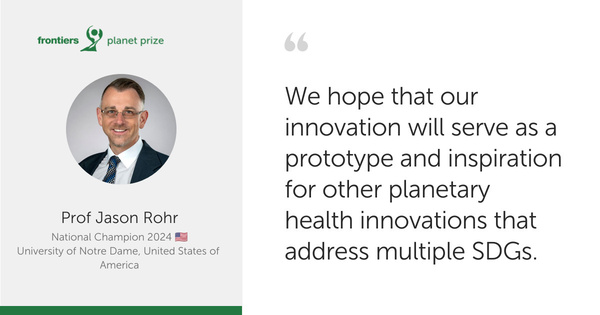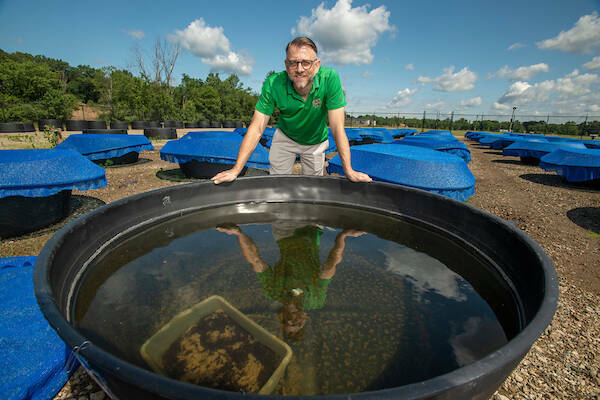Jason Rohr named U.S. national champion for Frontiers Planet Prize for breakthrough sustainability research
Jason Rohr, Galla Professor and Chair of the Department of Biological Sciences at the University of Notre Dame, is the United States national champion for the Frontiers Planet Prize, which recognizes research that accelerates solutions in the field of sustainability science.

Rohr was one of 23 national champions from across six continents. His winning research, A planetary health innovation for disease, food, and water challenges in Africa, was recommended by the National Academy of Sciences to a jury of 100 renowned sustainability and planetary health experts for the prize, administered by the Frontiers Research Foundation. The prize rewards and promotes breakthroughs that show the greatest potential to keep the planet from crossing what are known as “planetary boundaries.” These are processes that regulate the stability and resilience of earth systems, such as climate change, freshwater change, and land system change.
Published in Nature in 2023, Rohr’s research focuses on reducing schistosomiasis, a parasitic disease affecting more than 250 million people worldwide that causes organ damage and death, and is transmitted to humans from freshwater snails that are infected with parasitic flatworms. However, Rohr and collaborators study more than ways to reduce disease. Their interdisciplinary approach includes removing snail-loving vegetation at water access points, composting the vegetation, feeding the vegetation to livestock, and providing economic opportunities from the profitable compost and livestock feed.
Rohr said he was thrilled and honored that his research was chosen as the U.S. national champion. Now in its second year, the Frontiers Research Foundation, based in Switzerland, has received prize nominations from 20 academies of science and 475 leading universities and research institutions among 43 countries. The National Academy of Sciences advanced only three for consideration by the jury.
“I really want to see our research change people’s lives, and it has that potential … I think there’s a tremendous amount of promise,” Rohr said. “There are all sorts of challenges and issues in Africa and around the world, and there are very few people who are intentionally embracing the complexity of all of the grand challenges and their intersections, because most research focuses on single challenges, such as food, or water, or disease. But by staying in these silos, I think we miss potential solutions.”
The snails that transmit the flatworm prefer to live in the vegetation that proliferates partially because of fertilizer runoff. People can become infected multiple times when using waterways for washing and leisure, Rohr said. While removing the vegetation is an effective way to control it, Rohr and collaborators didn’t want to simply waste it, so they converted it into compost and livestock feed, which recaptures nutrients in a cost-friendly manner.
The research team also studied how the vegetation can be profitably combined with cow manure to “feed” biodigesters, which are systems that convert organic matter into fertilizer and methane gas. The gas can be used for cooking or in generators for electricity production. The researchers partner with the Senegal National Biogas Program to leverage thousands of biodigesters that the Swiss government has and will continue to install.
“So far, the biodigester experiments look super promising. Combining the removed vegetation with cow manure in biodigesters appears to improve the gas quality relative to either input alone,” Rohr said.

To scale the research, the team developed remote sensing technology, using drones, to detect the vegetation and target the innovation where it is most needed. Additionally, Rohr and collaborators have partnered with the Senegalese Ministry of Health to provide education and training to 88 communities that will help determine whether residents will maintain the program in the absence of researcher assistance.
“The next thing we’ll do is work with our economist to identify the most cost-effective use of the vegetation,” Rohr said. “However, what is even more important is the use that communities are willing to adopt.”
The Frontiers Planet Prize targets exactly this type of interdisciplinary, collaborative research, according to the organization. Three international champions will be selected in June 2024, with a prize of 1 million Swiss Francs (CHF) each to support their research.
“We are confronted with an environmental crisis on a planetary scale, creating a true threat for humanity,” Jean-Claude Burgelman, director of the Frontiers Planet Prize, said in a news release. “The ambition of the Frontiers Planet Prize is to directly address this crisis by mobilizing scientists engaged in breakthrough research, and we congratulate the National Champions.”
“Professor Rohr’s research brilliantly tackles multiple sustainable development problems, offering transformative solutions for our planet,” said Santiago Schnell, the William K. Warren Dean of the College of Science at the University of Notre Dame. “His work not only combats a devastating neglected tropical disease but also provides a scalable model for other nations across Africa and the globe.
“We are immensely proud that the Frontiers Research Foundation has recognized Professor Rohr's project as a national champion. His work stands as a testament to the power of research to change lives."
The research was funded by the National Institutes of Health, the National Science Foundation, the Indiana Clinical and Translational Sciences Institute, and a Stanford seed grant. A complete list of co-authors can be found on the paper at Nature.
Originally published by at science.nd.edu on April 22, 2024.
Latest Research
- NDTL shares aerospace research with local high school studentsMark H. Ross, senior research scientist at NDTL Propulsion & Power, recently stepped out of the lab and into a local high school. Ross, who received his Ph.D. in Aerospace Engineering from Notre Dame in 2014, visited the computer science and engineering magnet…
- Notre Dame senior wins Best Publication Image AwardNotre Dame senior Kevin Armknecht of the Berthiaume Institute for Precision Health has been recognized by ND’s Integrated Imaging Facility (NDIIF) with the Best Publication Imaging Award, based on images he created in a recent Nanoscale Advances publication. Armknecht, a pre-professional studies…
- A&L and engineering faculty to create new curriculum for responsible computingFaculty from the College of Arts and Letters and the College of Engineering are working together to integrate responsible computing instruction across the undergraduate curriculum, to better equip students to think critically and thoughtfully about technology. The project, “Computing, Culture, and Society: A Community-based, Intersectional Approach to Responsible Computing Across the Curriculum,” is led by Katherine Walden and Karla Badillo-Urquiola.
- Keough School establishes two new doctoral programsNotre Dame’s Keough School of Global Affairs has established two new doctoral programs in sustainable development and peace studies. The peace studies and sustainable development programs will enable doctoral students in the Keough School to examine from different perspectives the intersection of poverty, the environment, violent conflict and peace. Both programs will enroll students beginning in fall 2025.
- Robert Norton earns A&L Research Achievement Award for his transformative impact on German intellectual history“My interest is in the invisible, or at least the hard-to-discern, currents of thought that inform large cultural phenomena," Robert Norton said. "My scholarly career is devoted to understanding the nature of the impact and what lies underneath and what was lost.”
- ISLA Funds Twelve Projects Examining “Technology and the Common Good” through 2023-24 Annual Research Theme Grant ProgramLast spring, the Institute for Scholarship in the Liberal Arts announced “Technology and the Common Good” as its annual research theme for AY 2023-2024. Taking to heart the notion that technology is a subject of inquiry not only for science and engineering but also the liberal arts, ISLA invited proposals…













